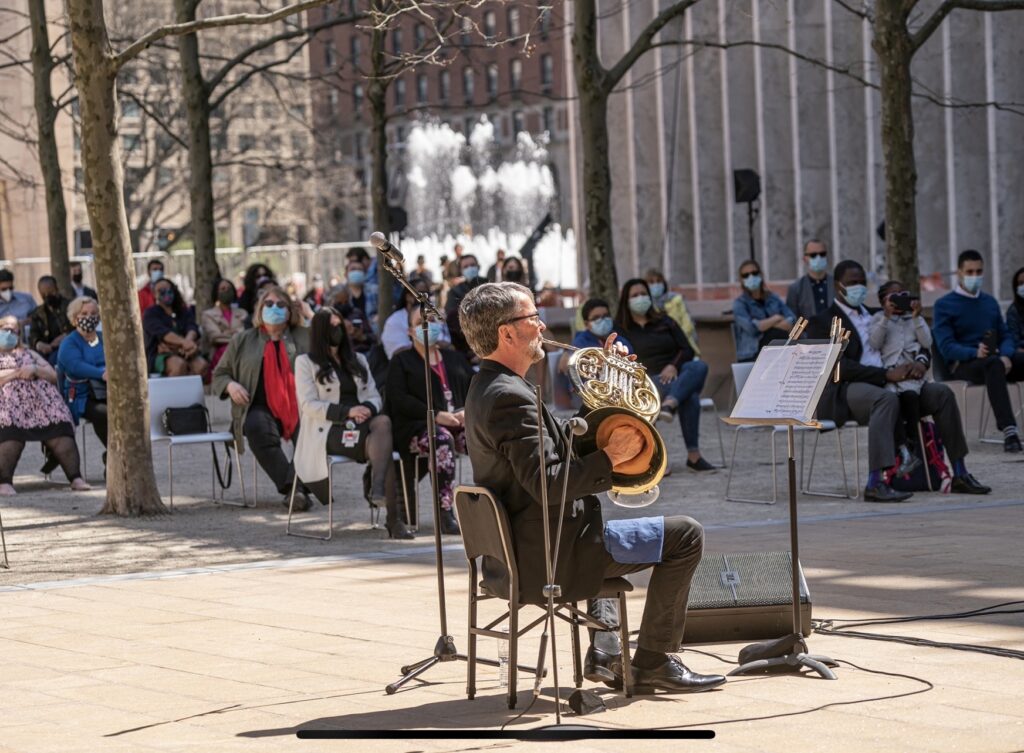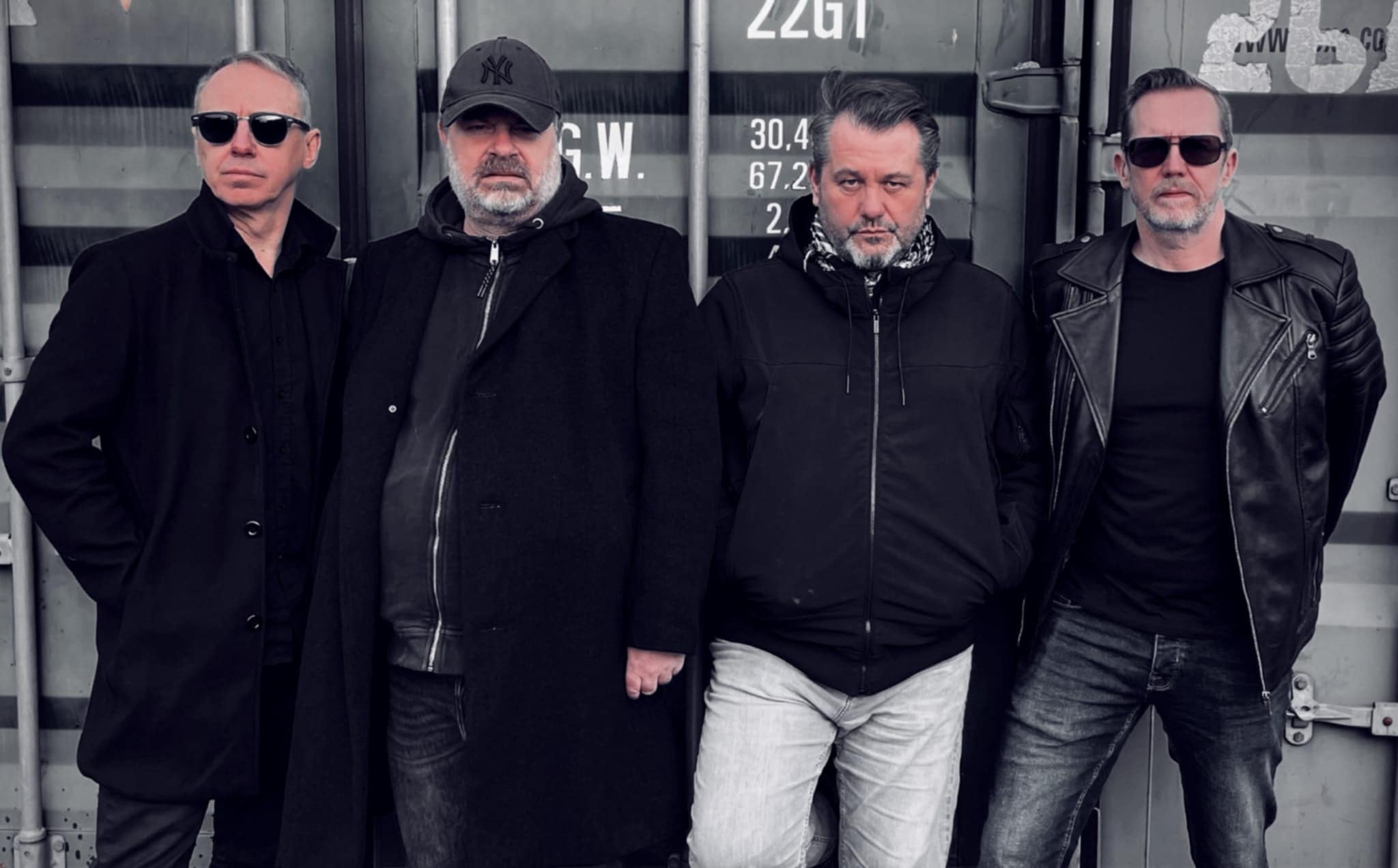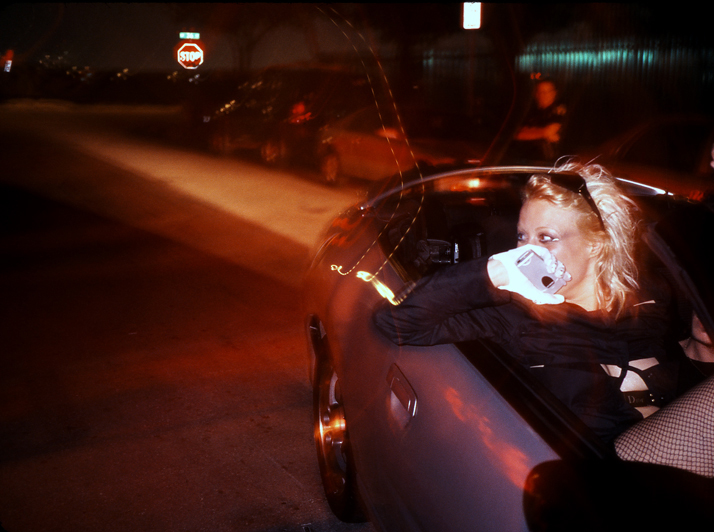(NEW YORK) — The halls of Lincoln Center have been eerily quiet since the pandemic came to New York. No arias filling the air, pointe shoes running across the stage, or bows gliding across violin strings. The hard silence of canceled concerts, musicals, ballets, and operas is finally changing with a series of outdoor performances reminding visitors that Lincoln Center is still alive and well.
Although the theaters themselves will not be open for some time, this small start is welcome news for the hundreds of performers who worked at Lincoln Center.
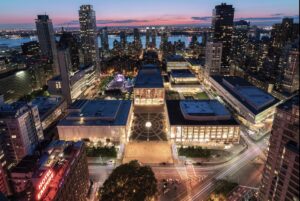
An aerial view of Lincoln Center in New York City. [Credit: Iñaki Vinaixa]
Artists at Home
On April 9, as the pandemic was beginning to spread through New York and the world, Lincoln Center closed its doors and canceled all future performances and outdoor activities. With more than 350 performances presented annually each year, the decision was unprecedented and an unexpected turn of events for its workers and performers.
Like many other performing arts organizations, Lincoln Center started streaming previously filmed productions for the public to watch at home. A portal was also created called “Lincoln Center at Home” where various concerts and performances were made accessible online.

Lincoln Center closed down and fences surrounding it during the pandemic shutdown. (Credit: Michael McILwee]
In the beginning, many artists believed that theater and the arts would come back. With mixed messaging from the government and a lack of information, few could anticipate the severity of what was to come during the lockdown. As weeks gave way to months, it became clear that live performances would not be coming back to Lincoln Center for quite some time.
Performers were faced with new difficulties and decisions. Many had to find ways to create without a place to perform and some had to change their livelihoods completely.
“I early on felt the stages of grief,” said Ryann Lynch, a dresser for The Metropolitan Opera, American Ballet Theater, and Radio City Music Hall.
“By the summer, I realized that we weren’t going back,” said Lynch. “I’m a workaholic, and this year was the first time I was able to do the opposite. I had a little bit more time, I love being outside, and I probably biked 300 miles this summer.”
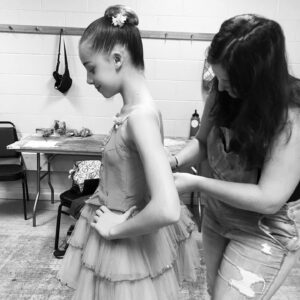
Ryann Lynch helps dress a dancer at Lincoln Center. [Credit: Ryann Lynch]
Kate Mangiameli is an opera singer who is a member of the Metropolitan Opera chorus. She was set to appear in what would have been her 10th season with the Met before all performances were canceled last year.
“The adjustment to going from full-time working mom to full-time stay-at-home mom overnight was really difficult,” Mangiameli said.

Kate Mangiameli poses in a costume for a production of “The Queen of Spades” at The Metropolitan Opera. [Credit: Kate Mangiameli]
Justin Peck is a choreographer, director, and dancer for New York City Ballet. He won a Tony Award for Best Choreography for the 2012 revival of Carousel. Peck most recently choreographed Steven Spielberg’s upcoming film remake of West Side Story.
“It’s complicated. There are frustrations during this time, but there are also silver linings,” he said. “I’ve been trying to stay optimistic and trying to stay constructive but also embracing slowing down for the time being.”
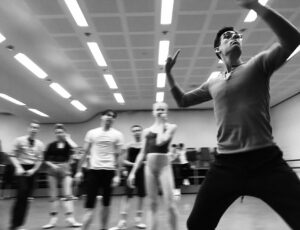
Justin Peck choreographing for dancers at New York City Ballet. [Credit: Devin Alberda]
“So my hope is we can get to a place where there is a resurgence of live performing arts in New York and in the world. I’m hopeful that we turned a corner with the rollout of the vaccines and hopefully getting to a place where the public feels safe to be able to go out and enjoy a performance.”
“Our Business Was Very Badly Affected”
The halting of live performances affected many businesses and restaurants in New York. Before the pandemic struck, guests would visit restaurants all over the Upper West Side near Lincoln Center for a pre-show dinner. These spots were also hangouts and places to wind down for performers and musicians after their shows.
Lincoln Center audiences provided 50 percent of the regular customers for Il Violino restaurant on 68th Street, according to manager Daniel Vlasceanu.
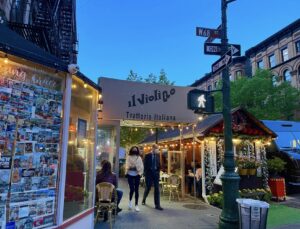
Guests dining outside of Il Violino restaurant in the Upper West Side. [Credit: Michael McIlwee]
During the summer, like many other restaurants, Il Violino had to adapt to the changes COVID brought by beefing up its take-out business and later building an outdoor structure for al fresco dining.
In July of last year, musicians from Lincoln Center started playing music outside to entertain guests. It allowed these artists to perform again while helping the restaurant at the same time, Vlasceanu said.
Restaurants have started to see a small increase in customers with Lincoln Center taking steps to bring audiences back with Restart Stages, a sweeping program of outdoor performances meant to fill the gap while indoor stages are dark.
A Year of Reflection and Change
The performing arts industry saw massive change start to happen after the George Floyd social justice protests last summer. Theatrical companies and organizations were called upon to be more transparent, fairer in their casting and hiring choices, and change outdated practices.
“I believe there has been an awakening, “ Broadway star Audra McDonald told the Click. “To quote the Ragtime song, “We Can Never Go Back to Before,” McDonald said.
McDonald is one of the most famous artists involved with Lincoln Center, having performed on all its major stages. The six-time Tony Award winner is the host of Live From Lincoln Center and serves on the Board of Trustees for Lincoln Center.
“I think there is a lens with which we are looking through now, which is the lens of this pandemic and the pandemic of racism that has been going on for 400-plus years in this country. That lens is sharpened and brought into great detail now. You can’t unsee things now.”
Last year, in response to the murder of George Floyd in Minneapolis and the national unrest that followed, McDonald helped create Black Theatre United (BTU) along with artists Billy Porter, Vanessa Williams, Lillias White, Norm Lewis, and Brian Stokes Michell.
BTU has promoted census participation, hosted town halls, and created mentorship programs for young Black artists.

Audra McDonald [Credit: Allison Michael Orenstein]
“We are working to raise awareness and protect disenfranchised communities. We are here to protect Black talent and Black lives. We are dismantling the systems of racism that keep Black talent from getting to the theater. My hope 50 years from now is that we won’t need an organization like this. Right now, they’re needed.”
New Beginnings With Restart Stages
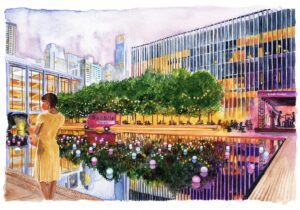
An artist’s rendering of Restart Stages at Lincoln Center. [Credit: Illustration by Ceylan A. Sahin Eker]
Restart Stages kicked off with a performance by the New York Philharmonic for healthcare workers. The scene looked much different than the hundreds of people usually roaming around the grounds of Lincoln Center. Guests were socially distanced and spread out in chairs, but it was a big step for the city.
“We piloted a few small outdoor performances last fall, and the response was so positive that we immediately began to think about how we could build upon the idea once the weather started warming up again,” said Clive Chang, chief strategy & innovation officer for Lincoln Center.
All offerings will occur outdoors with safety protocols in place for artists, audiences, and staff.
“The cultural community has an urgent role to play in the revitalization of New York, to showcase that our city is not just back economically, but spiritually and socially,” said Henry Timms, CEO and president of Lincoln Center.
Lincoln Center has taken steps to include artists and open channels outside of their own companies to participate in Restart Stages. Some of the groups participating are the Bronx Academy of Arts and Dance, Caribbean Cultural Center African Diaspora Institute, Harlem Week and the Harlem Arts Alliance, Korean Cultural Center New York, and Weeksville Heritage Center.
As a Lincoln Center trustee, McDonald says we may need to look back to look forward. “The sacred thing about theater -if you look at the Greeks, for example- wherever you have an audience and performers – that’s your theater right there.”
